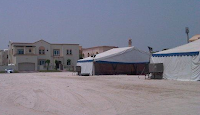London Heathrow now
serves Dubai 12x a day of which Emirates Airlines ferries passengers and
British expats on 5 of their Airbus A380 Super Jumbo’s. That’s almost as many
flights as between Heathrow and Edinburgh. On board an Emirates flight, one
quickly feels at home despite Arabic writing and air hostesses (wearing a
discreet veil to welcome passengers). The announcements are made in a
pre-recorded Oxford British accent. The in-flight shopping Magazine is called “The
Emirates High Street” and the 900+ channels of in-flight entertainment are
clearly programmed by Brits for an international audience but include many
channels devoted to British culture, soap operas, sports and even feature your
favourite British cooking chefs.
The British influence
in Dubai dates back to the 1820’s when the British created the Trucial States
between the neighbouring Sheikhdom’s as a Maritime treaty to bring peace and
increase trade (and serve the Brits interest in the region until the UAE gained
independence in 1971). The British expat population in those days was tiny
compared to over 100,000 British expats who live in Dubai today. This makes
Dubai roughly the same size, as Cheltenham but the true number of Brits living
in Dubai is probably closer to that of Cambridge as most expats are not
registered with the British Embassy.
Britishness is
everywhere in Dubai! A one hour drive around town makes this apparent. First
tune in to the radio where there are several radio stations run by and aimed at
the British expaits including 92FM with
a popular morning breakfast show hosted by two northeners: “Catboy and Geordiebird”.
This chat show makes Brits feel at home with celebrity gossip, songs and other
news from the rainy island.
You will probably
drive past countless British schools which curriculums adhered to GCSE’s and
A-Levels so your children can easily fit back in to the UK education system. On
the weekends parents take their children to: rugby, cricket, golf and polo grounds
which have formal clubs where you are more likely to meet a couple from
Nottinghamshire and Warwickshire than a UAE citizen.
 |
Hotels although mostly Arabian in appearance
and décor, are often managed by Brits and cater to British Expats and tourists
alike. They serve Saturday roasts (Sunday being the start of the week) served
with Yorkshire pudding and Worcestershire sauce. Most big hotels have their own
British pubs where you can watch the latest Darts competition on Satellite TV whilst
sipping on a Brown Ale and starring at British memorabilia hung up on the wall.
You could almost be in Lancashire!
A stop by one of the
giant malls such as the Mall of Emirates will also reveal that many of the
stores including the flagship store Harvey Nichols were imported straight from
a UK High Street.
Even this Christmas
period, a quintessentially British tradition: the Pantomine is on show in a
theatre complete with Benny Hill and other British type gags and farces. This last example shows that the Brits are
here to stay in Dubai and no longer view Dubai as a 2-3 year international
experience to boost their careers or make a bit of extra money. The population
of Dubai is made up of 90% of expatriates (see this article for further info) many of whom view Dubai as a
short-term move . But the Brits are increasingly joining the Indians, Pakistanis
and Iranians who try and stay in Dubai and renew their residency visas for as
long as they can do so as it is still impossible to have permanent residency or
gain citizenship.
Alas, there are also
some negative aspects imported by the Brits which include binge drinking and
people being arrested in compromising situations. Some Brits also feel that
they are superior to other nationalities/expats behave with a British Colonialist attitude.
Good times lie ahead for DubaiShire and if you are a Brit it will feel increasingly feel like a home from home.




















